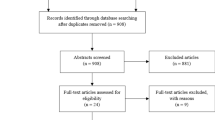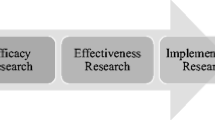Abstract
Background
The impact of illicit substance use is especially devastating in low-resourced countries where factors such as poverty, unemployment, and inadequate services impede successful treatment. Contingency management (CM) is a treatment for substance use disorders that has shown to be effective in eliciting behaviour change. The efficacy of CM interventions in low and middle income countries (LMICs) has been under explored.
Methods
The aim of this systematic review of randomized controlled trials was to assess measures of CM efficacy in addressing substance use disorders, while also considering contextual moderators of CM in LMICs. A search of PubMed, Scopus, and Cochrane library databases yielded 18 studies for inclusion, from which relevant data were extracted using modified versions of the Cochrane Characteristics of Studies tool.
Results
Two studies were located in a low-income country, two in lower-middle income countries, and fourteen in upper middle-income countries. Overall, estimated efficacy estimates were similar to those from higher income countries. However, context-specific challenges that warrant further investigation included limited access to trained staff and structural and financial constraints.
Conclusions
While CM in LMICs is in its early stages of development, efficacy estimates were not substantially different compared to high income countries. Challenges such as costs, willingness to implement, and the stigma associated with addiction sets the stage for further research in these contexts.

Similar content being viewed by others
References
World Drug Report 2018. World Drug Report: UN. 2018.
Higgins ST. Extending Contingency Management to the Treatment of Methamphetamine Use Disorders. Am J Psychiatry. 2006;163(11):1870–2.
Lussier JP, Heil SH, Mongeon JA, Badger GJ, Higgins ST. A meta-analysis of voucher-based reinforcement therapy for substance use disorders. Addiction. 2006;101(2):192–203.
Petry NM, Alessi SM, Rash CJ. A randomized study of contingency management in cocaine-dependent patients with severe and persistent mental health disorders. Drug Alcohol Depend. 2013;130(1–3):234–7.
Skinner BF. Operant behavior. Am Psychol. 1963;18(8):503–15.
Sorensen JL, Haug NA, Delucchi KL, Gruber V, Kletter E, Batki SL, et al. Voucher reinforcement improves medication adherence in HIV-positive methadone patients: a randomized trial. Drug Alcohol Depend. 2007;88(1):54–63.
Noordraven EL, Audier CH, Staring ABP, Wierdsma AI, Blanken P, van der Hoorn BEA, et al. Money for medication: a randomized controlled study on the effectiveness of financial incentives to improve medication adherence in patients with psychotic disorders. BMC Psychiatry. 2014;14:343.
Wahler RG. Contingency Management with Oppositional Children: Some Critical Teaching Issues for Parents. Families, Schools, and Delinquency Prevention: Springer New York. 1987; p. 112–31.
Muir Gray JA. Evidence-based healthcare: how to make health policy and management decisions. London: Churchill Livingstone; 1997. London: Churchill Livingstone; 1997.
Higgins JPT, Thomas J, Chandler J, Cumpston M, Li T, Page MJ, et al. Cochrane Handbook for Systematic Reviews of Interventions version 6.0 (updated July 2019) 2019. Available from www.training.cochrane.org/handbook.
Slade M, Priebe S. Are randomised controlled trials the only gold that glitters? Br J Psychiatry. 2001;179:286–7.
Egger M, Jüni P, Bartlett C, Holenstein F, Sterne J. How important are comprehensive literature searches and the assessment of trial quality in systematic reviews? Empirical study Health Technology Assessment. 2003;7(1):1–82.
American Psychiatric A. Diagnostic and Statistical Manual of Mental Disorders: American Psychiatric Association. 2013.
Fantom N, Serajuddin U. The World Bank's Classification of Countries by Income. World Bank. 2016.
Hser Y-I, Li J, Jiang H, Zhang R, Du J, Zhang C, et al. Effects of a randomized contingency management intervention on opiate abstinence and retention in methadone maintenance treatment in China. Addiction (Abingdon, England). 2011;106(10):1801–9.
Otiashvili D, Kirtadze I, O’Grady KE, Jones HE. Drug use and HIV risk outcomes in opioid-injecting men in the Republic of Georgia: behavioral treatment + naltrexone compared to usual care. Drug Alcohol Depend. 2012;120(1–3):14–21.
Chen W, Hong Y, Zou X, McLaughlin MM, **a Y, Ling L. Effectiveness of prize-based contingency management in a methadone maintenance program in China. Drug Alcohol Depend. 2013;133(1):270–4.
Chawarski MC, Mazlan M, Schottenfeld RS. Behavioral drug and HIV risk reduction counseling (BDRC) with abstinence-contingent take-home buprenorphine: A pilot randomized clinical trial. Drug Alcohol Depend. 2008;94(1–3):281–4.
Carrico AW, Nil E, Sophal C, Stein E, Sokunny M, Yuthea N, et al. Behavioral interventions for Cambodian female entertainment and sex workers who use amphetamine-type stimulants. J Behav Med. 2016;39(3):502–10.
Page K, Carrico AW, Stein E, Evans J, Sokunny M, Maly P, et al. Cluster randomized stepped-wedge trial of a multi-level HIV prevention intervention to decrease amphetamine-type stimulants and sexual risk in Cambodian female entertainment and sex workers. Drug Alcohol Depend. 2019;196:21–30.
Miguel AQC, Madruga CS, Cogo-Moreira H, Yamauchi R, Simões V, da Silva CJ, et al. Contingency management is effective in promoting abstinence and retention in treatment among crack cocaine users in Brazil: A randomized controlled trial. Psychol Addict Behav. 2016;30(5):536–43.
Miguel AQC, Sandi Madruga C, Simões V, Yamauchi R, da Silva CJ, McDonell M, et al. Contingency management is effective in promoting abstinence and retention in treatment among crack cocaine users with a previous history of poor treatment response: a crossover trial. Psicologia: Reflexão e Crítica. 2019;32(1):14.
Miguel AQC, McPherson SM, Simoes V, Yamauchi R, Madruga CS, Smith CL, et al. Effectiveness of incorporating contingency management into a public treatment program for people who use crack cocaine in Brazil. A single-blind randomized controlled trial. Int J Drug Policy. 2022;99:103464.
Miguel AQC, Simoes V, Yamauchi R, Madruga CS, da Silva CJ, Laranjeira RR, et al. Acceptability and feasibility of incorporating contingency management into a public treatment program for homeless crack cocaine users in Brazil: A pilot study. Exp Clin Psychopharmacol. 2022;30(5):507–13.
Pirnia B, Tabatabaei SKR, Tavallaii A, Soleimani AA, Pirnia K. The Efficacy of Contingency Management on Cocaine Craving, using Prize-based Reinforcement of Abstinence in Cocaine Users. Electron Physician. 2016;8(11):3214–21.
Pirnia B, Moradi AR, Pirnia K, Kolahi P, Roshan R. A Novel Therapy for cocaine dependence during abstinence: A randomized clinical trial. Electron Physician. 2017;9(7):4862–71.
Pirnia B, Soleimani A, Taherinakhost HR, Pirnia K, Malekanmehr P, Zahiroddin A. A Randomized Pilot Trial of Contingency-management Intervention for Patients in during Methadone Maintenance Treatment, Cash vs. Vouchers Iran J Public Health. 2018;47(4):618–9.
Jiang H, Du J, Wu F, Wang Z, Fan S, Li Z, et al. Efficacy of contingency management in improving retention and compliance to methadone maintenance treatment: a random controlled study. Shanghai Arch Psychiatry. 2012;24(1):11–9.
Giné X, Karlan D, Zinman J. Put Your Money Where Your Butt Is: A Commitment Contract for Smoking Cessation. Am Econ J Appl Econ. 2010;2(4):213–35.
White JS, Dow WH, Rungruanghiranya S. Commitment contracts and team incentives: a randomized controlled trial for smoking cessation in Thailand. Am J Prev Med. 2013;45(5):533–42.
Hofmeyr A, Kincaid H, Rusch O. Incentivizing university students to quit smoking: a randomized controlled trial of a contingency management intervention in a develo** country. Am J Drug Alcohol Abuse. 2020;46(1):109–19.
Jirapramukpitak T, Pattanaseri K, Chua KC, Takizawa P. Home-Based Contingency Management Delivered by Community Health Workers to Improve Alcohol Abstinence: A Randomized Control Trial. Alcohol Alcohol. 2020;55(2):171–8.
Petry NM. A comprehensive guide to the application of contingency management procedures in clinical settings. Drug Alcohol Depend. 2000;58(1–2):9–25.
Silverman K, Chutuape MA, Bigelow GE, Stitzer ML. Voucher-based reinforcement of cocaine abstinence in treatment-resistant methadone patients: effects of reinforcement magnitude. Psychopharmacology. 1999;146(2):128–38.
Petry NM, Tedford J, Austin M, Nich C, Carroll KM, Rounsaville BJ. Prize reinforcement contingency management for treating cocaine users: how low can we go, and with whom? Addiction (Abingdon, England). 2004;99(3):349–60.
Elliott R, Tighe T. Breaking the Cigarette Habit: Effects of a Technique Involving Threatened Loss of Money. The Psychological Record. 1968;18(4):503–13.
Festinger DS, Dugosh KL, Kirby KC, Seymour BL. Contingency management for cocaine treatment: cash vs. vouchers. J Subst Abuse Treat. 2014;47(2):168–74.
Silverman K. Sustained Cocaine Abstinence in Methadone Maintenance Patients Through Voucher-Based Reinforcement Therapy. Arch Gen Psychiatry. 1996;53(5):409.
Silverman K, Wong CJ, Higgins ST, Brooner RK, Montoya ID, Contoreggi C, et al. Increasing opiate abstinence through voucher-based reinforcement therapy. Drug Alcohol Depend. 1996;41(2):157–65.
Bolivar HA, Klemperer EM, Coleman SRM, DeSarno M, Skelly JM, Higgins ST. Contingency Management for Patients Receiving Medication for Opioid Use Disorder: A Systematic Review and Meta-analysis. JAMA Psychiat. 2021;78(10):1092–102.
Miguel AQC, Madruga CS, Simoes V, Yamauchi R, da Silva CJ, Abdalla RR, et al. Crack cocaine users views regarding treatment with contingency management in Brazil. Subst Abuse Treat Prev Policy. 2018;13(1):7.
Miguel AQC, Madruga CS, Cogo-Moreira H, Yamauchi R, Simoes V, Ribeiro A, et al. Contingency management targeting abstinence is effective in reducing depressive and anxiety symptoms among crack cocaine-dependent individuals. Exp Clin Psychopharmacol. 2017;25(6):466–72.
Acknowledgements
This research was supported by the National Institute of Drug Abuse (R21DA040492).
Author information
Authors and Affiliations
Corresponding author
Ethics declarations
Disclaimer
The content of this article is solely the responsibility of the authors and does not necessarily represent the official views of the National Institutes of Health.
Conflict of interest
The authors declare that they have no conflict of interest.
Statement Regarding Informed Consent
Not Applicable.
Statement Regarding Ethical Approval
Not Applicable.
Statement Regarding the Welfare of Animals
Not applicable.
Additional information
Publisher's Note
Springer Nature remains neutral with regard to jurisdictional claims in published maps and institutional affiliations.
Rights and permissions
Springer Nature or its licensor (e.g. a society or other partner) holds exclusive rights to this article under a publishing agreement with the author(s) or other rightsholder(s); author self-archiving of the accepted manuscript version of this article is solely governed by the terms of such publishing agreement and applicable law.
About this article
Cite this article
Kalmin, M.M., Nicolo, C., Long, W. et al. A Systematic Review of the Efficacy of Contingency Management for Substance Use Disorders in Low and Middle Income Countries. Int.J. Behav. Med. (2023). https://doi.org/10.1007/s12529-023-10197-8
Accepted:
Published:
DOI: https://doi.org/10.1007/s12529-023-10197-8




